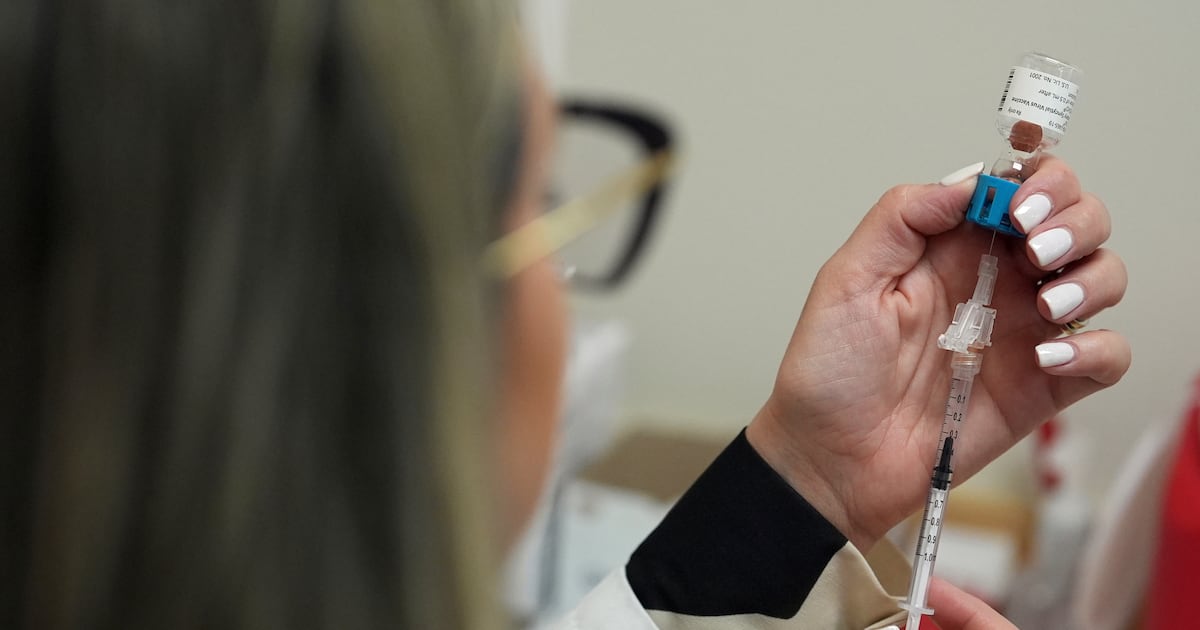Health
Saskatchewan Expands RSV Immunizations to All Newborns Starting October 1

Saskatchewan is set to broaden its immunization program for respiratory syncytial virus (RSV) to encompass all newborns, beginning on October 1, 2025. Previously, only high-risk infants and children received this vital immunization, which required monthly administration throughout the RSV season. This new initiative aims to protect the province’s youngest residents as the season for colds, flus, and other respiratory viruses approaches.
The updated program will introduce a new immunization that requires just a single injection, effective for a minimum of five months during the RSV season. According to Rachel Leavitt, manager of the RSV Immunization Program, studies indicate that the antibodies generated from this immunization could offer protection against severe RSV for as long as eight months. Babies born between October 1, 2025, and March 31, 2026, will be eligible for this shot, which can be administered before they leave the hospital, pending parental consent.
Most infants and young children will not require a second dose, as Leavitt explains, “Typically, RSV most significantly impacts infants in their first RSV season. By their second RSV season, most babies have a more robust immune system and their lungs are more developed, reducing their risk of severe RSV if they are otherwise healthy.”
Personal Stories Highlight Importance of Immunization
The expansion of the immunization program is welcomed by parents who have faced the challenges of RSV firsthand. Kayla Jakubowski and her husband Matt Temple wish this program had been available when their son, Barrett, was born. Barrett tested positive for RSV at the age of one, suffering severe symptoms including labored breathing and a life-threatening cardiac arrest. Jakubowski recalls the harrowing experience, “He was on a respirator. They didn’t think he would make it. The first three days were very touch-and-go.”
Despite Barrett’s recovery, he continues to experience lingering effects from his illness, including a diagnosis of an acquired brain injury. Over two years, he has made significant progress, learning to eat, sit, and talk independently, with walking as his next milestone. Jakubowski and Temple are still vigilant during cold and flu season, as Jakubowski states, “I worry every time he starts to get a runny nose or a congested chest. I go into panic mode.”
They encourage other parents to consider the benefits of immunizing their newborns against RSV.
Medical Experts Support New Immunization Approach
Pediatric respirologist Dr. Darryl Adamko describes the RSV immunization as a significant advancement in pediatric healthcare. He emphasizes that “Babies are not designed to handle a bad infection,” highlighting the particular severity of RSV in infants, who are especially vulnerable due to their small airways. While the immunization will not entirely eliminate RSV infections, it has the potential to reduce hospitalizations by approximately 70 to 80 percent, alleviating the strain on healthcare facilities during peak seasons. “Every year, the biggest reason that we have hospital beds taken up is with babies from November to March,” he adds.
Other provinces, including Manitoba and Nova Scotia, are also expanding their RSV immunization programs, while Ontario, Quebec, and the Northwest Territories introduced similar initiatives last year. Leavitt assures that the injection is “extremely safe,” with no reports of serious adverse reactions.
As Saskatchewan implements this important health initiative, the hope is that it will significantly improve the outcomes for newborns and their families during the RSV season.
-

 Education2 months ago
Education2 months agoBrandon University’s Failed $5 Million Project Sparks Oversight Review
-

 Lifestyle3 months ago
Lifestyle3 months agoWinnipeg Celebrates Culinary Creativity During Le Burger Week 2025
-

 Science3 months ago
Science3 months agoMicrosoft Confirms U.S. Law Overrules Canadian Data Sovereignty
-

 Health3 months ago
Health3 months agoMontreal’s Groupe Marcelle Leads Canadian Cosmetic Industry Growth
-

 Science3 months ago
Science3 months agoTech Innovator Amandipp Singh Transforms Hiring for Disabled
-

 Technology3 months ago
Technology3 months agoDragon Ball: Sparking! Zero Launching on Switch and Switch 2 This November
-

 Education3 months ago
Education3 months agoRed River College Launches New Programs to Address Industry Needs
-

 Technology3 months ago
Technology3 months agoGoogle Pixel 10 Pro Fold Specs Unveiled Ahead of Launch
-

 Technology1 month ago
Technology1 month agoDiscord Faces Serious Security Breach Affecting Millions
-

 Business2 months ago
Business2 months agoRocket Lab Reports Strong Q2 2025 Revenue Growth and Future Plans
-

 Science3 months ago
Science3 months agoChina’s Wukong Spacesuit Sets New Standard for AI in Space
-

 Education3 months ago
Education3 months agoAlberta Teachers’ Strike: Potential Impacts on Students and Families
-

 Technology3 months ago
Technology3 months agoWorld of Warcraft Players Buzz Over 19-Quest Bee Challenge
-

 Business3 months ago
Business3 months agoNew Estimates Reveal ChatGPT-5 Energy Use Could Soar
-

 Business3 months ago
Business3 months agoDawson City Residents Rally Around Buy Canadian Movement
-

 Education3 months ago
Education3 months agoNew SĆIȺNEW̱ SṮEȽIṮḴEȽ Elementary Opens in Langford for 2025/2026 Year
-

 Technology1 month ago
Technology1 month agoHuawei MatePad 12X Redefines Tablet Experience for Professionals
-

 Technology3 months ago
Technology3 months agoFuture Entertainment Launches DDoD with Gameplay Trailer Showcase
-

 Business3 months ago
Business3 months agoBNA Brewing to Open New Bowling Alley in Downtown Penticton
-

 Technology3 months ago
Technology3 months agoInnovative 140W GaN Travel Adapter Combines Power and Convenience
-

 Technology3 months ago
Technology3 months agoGlobal Launch of Ragnarok M: Classic Set for September 3, 2025
-

 Science3 months ago
Science3 months agoXi Labs Innovates with New AI Operating System Set for 2025 Launch
-

 Technology3 months ago
Technology3 months agoNew IDR01 Smart Ring Offers Advanced Sports Tracking for $169
-

 Technology3 months ago
Technology3 months agoDiscover the Relaxing Charm of Tiny Bookshop: A Cozy Gaming Escape










